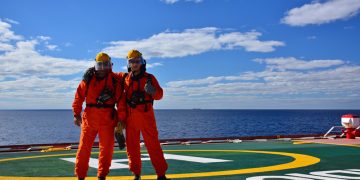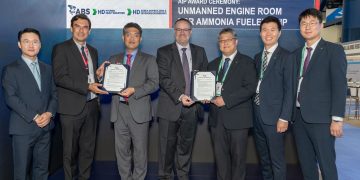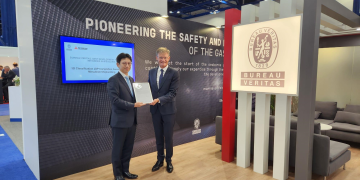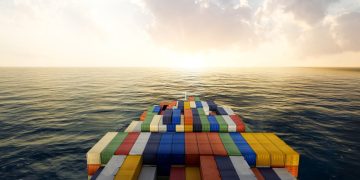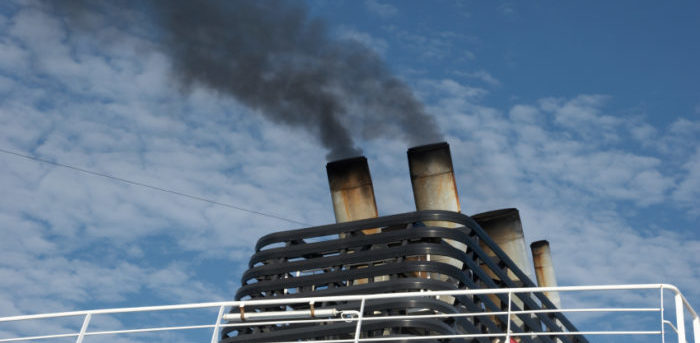Julien Dufour, CEO, Verifavia Shipping provided an update on ‘’EU Shipping MRV Regulation’’ during the 2016 GREEN4SEA Conference & Awards. He reminded that MRV Regulation 2015/757 came into force on 1st July 2015 and shipping companies operating in the EU have until 2017 to prepare plans to monitor and report their carbon emissions. From 2018 onwards, ships over 5,000 gross tonnage calling at EU ports must collect and submit verified annual data on CO2 emissions. They will also be required to carry a Document of Compliance issued by an accredited MRV verifier.
Verifavia is a global, independent and accredited environmental verification, certification and auditing body for aviation and maritime transport. Verifavia Shipping will be one of the first ever Shipping MRV verification bodies to be accredited.
MRV stands for monitoring, reporting and verification of fuel consumption, CO2 emissions, and transport work of ships. MRV is a system to collect and publish for comparison and statistical purposes data on CO2 emissions and efficiency of ships. MRV is a system designed by the European Commission (EC) for ships exceeding 5000 gross tonnage (GT) regardless of Flag or country of ownership, calling at an EU port from first of January of 2018 and carrying cargo or passengers for commercial purposes. The accountable entity in the EU MRV is the ship itself. Every ship, fulfilling the previous conditions, must:
- Develop its own monitoring plan (MP) and have it assessed by an independent verifier
- Monitor and report its emissions and activity data, starting on the first of January 2018
- Have its emissions report independently verified before submission to the Commission and Flag state
- Carry on-board a Document of Compliance (DOC) from June 2019, which highlights the vessels license to trade and operate.
Which voyages must be reported? Take for instance, a container ship; it loads cargo in Shanghai and then it stops in Singapore to load additional cargo. Then it goes through the Suez Canal where it stops for bunkering and after goes to Le Havre for loading part of the cargo and then terminates in Gothenburg to load the remaining part of the cargo. The question here is, which voyage must be reported? First we have to be familiar with the “term” voyage. A voyage is a journey between two ports of call. A port of call is a port where a ship stops to load or unload cargo or to embark or disembark passengers. A reportable voyage is a voyage where at least one port of call is in the EU. In the example above, we have to report two voyages. Given that a port of call is a port to load or unload cargo, and the ports of call here are Shanghai, Singapore, Le Havre and Gothenburg, this therefore means that the two voyages to be reported are Singapore to Le Havre, and Le Havre to Gothenburg.
The data that must be monitored for each voyage are the fuel consumption at sea, the fuel consumption at berth (which are monitored separately from the consumption at sea), the time at sea, the distance sailed, the cargo onboard, the transport work (which is the cargo onboard multiplied by the distance sailed), and the energy efficiency parameters.
In order to monitor the fuel consumption, there are four available monitoring methodologies:
Method A: Bunker Fuel Delivery Note (BDN) and periodic stock takes of fuel tanks
Method B: Bunker fuel tank monitoring on board
Method C: Flow meters for applicable combustion processes
Method D: Direct CO2 emission measurements.
Once you get the fuel consumption it is very easy to get CO2 emissions, by simply multiplying it by the emission factor.
The EU MRV process will commence in 2017, with shipowners required to submit their monitoring plan to a verifier for assessment by the end of August 2017. They will then need to start monitoring CO2 emissions, fuel consumption and transport work from 1st of January 2018. Following this, shipowners then need to prepare an initial emissions report at the start of 2019, and have this verified before it is submitted to the Flag state and the Commission. Last but not least, the vessel should carry onboard the document of compliance from June 2019. That’s the MRV process in a nutshell.
The MRV regulation consists of several parts. First the EU MRV Regulation itself (2015/757), which came into force in July 2015. This Regulation sets the framework of the MRV system and most of the technical details, but also calls for additional regulation in the form of delegated and implementing acts that are being drafted by the European Commission at the subgroup of experts under the umbrella of European sustainable shipping forum. Verifavia is a member of one of these subgroups responsible for defining the technical rules of the implementation of the regulation. Things seem to be on track, with the draft acts set to be published within a two months. Following this there will be public consultation, with the draft acts coming into force at the end of the year.
What does it take to become MRV-Ready? Even though the first deadline is next year in August, and even though the delegated and implementing acts are still being drafted by the Commission, there is enough information today and sufficient technical rules available to be able to start on the road to MRV. As 95% or more of the technical rules have been defined either formally or informally at working group level, it is possible to start the MRV process now.
How can Verifavia help? Verifavia is able to perform Pre-verification GAP-Analysis in 2016. This can include helping to draft the monitoring plan and assessing it as a verifier. In addition, Verifavia is able to conduct pre-verification of that a test emissions report . In doing so, shipowners will be ready to submit their final monitoring plan in 2017, the assessment in 2018, and in 2019 the reporting period.
Conducting a Pre-verification GAP-Analysis in 2016 offers shipping companies the following advantages:
- Preparation for EU MRV regulation
- Early identification of required corrective actions
- Advance on the assessment of the Monitoring Plan
- Communication/marketing advantage
- Compliance without delay
Following pre-verification GAP-Analysis, shipping companies found to be compliant are considered to be MRV ready and are issued with an MRV-READY certificate. Verifavia Shipping is a European company accredited in the UK as Verifavia (UK) LTD since 2010. Last month, Verifavia Shipping (Hellas) Ltd was established as the Regional HQ, which will further support the company’s operations in Greece and Cyprus.
In conclusion, Regulation 2015/757 came into force last year and was voted at Parliament and published in the Official Journal of the European Union. Given it is here to stay, there is no longer the need to try and fight it. Instead, shipowners must embrace it and ensure they are as ready as they can be to be compliant. This is where verifiers such as Verifavia Shipping can be of value to shipowners – working with them to ensure they are MRV ready.
Above text is an edited article of Julien Dufour’s presentation during the 2016 GREEN4SEA Conference & Awards
You may view his presentation by clicking here
| Click here to view all the presentations of 2016 GREEN4SEA Conference & Awards |
The views presented hereabove are only those of the author and not necessarily those of GREEN4SEA and are for information sharing and discussion purposes only.
[divider]
About Julien Dufour, CEO, VERIFAVIA & VERIFAVIA SHIPPING Verifavia Shipping
 Julien is a transport and environmental expert, verifier, researcher, speaker and moderator, with 20 years experience in the transport sector and 7 years experience in carbon emissions monitoring, reporting and verification. He is the Founder and CEO of Verifavia and Verifavia Shipping, the worldwide independent accredited carbon emissions verification bodies for aviation and maritime transport. Verifavia Shipping provides carbon emissions verification guidance and services that enable shipping companies to navigate the requirements of the EU Shipping Monitoring, Reporting and Verification (MRV) Regulation efficiently and effectively. By invitation of the European Commission, Julien is an active member of the ‘Shipping MRV group of experts on verification and accreditation’ under the European Sustainable Shipping Forum (ESSF). Julien holds a Masters in International Management from the ESCP Europe business school.
Julien is a transport and environmental expert, verifier, researcher, speaker and moderator, with 20 years experience in the transport sector and 7 years experience in carbon emissions monitoring, reporting and verification. He is the Founder and CEO of Verifavia and Verifavia Shipping, the worldwide independent accredited carbon emissions verification bodies for aviation and maritime transport. Verifavia Shipping provides carbon emissions verification guidance and services that enable shipping companies to navigate the requirements of the EU Shipping Monitoring, Reporting and Verification (MRV) Regulation efficiently and effectively. By invitation of the European Commission, Julien is an active member of the ‘Shipping MRV group of experts on verification and accreditation’ under the European Sustainable Shipping Forum (ESSF). Julien holds a Masters in International Management from the ESCP Europe business school.








